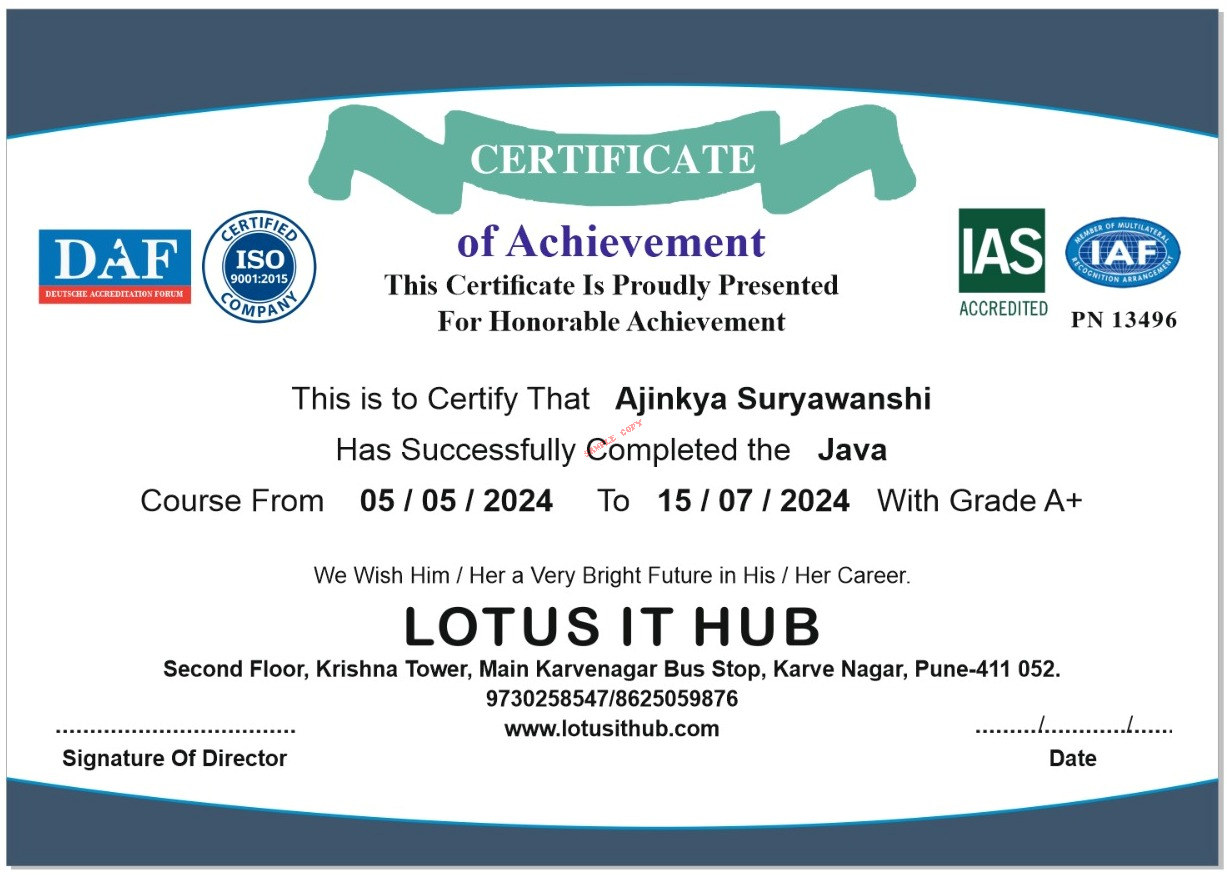Python Classes in Pune
Introduction to Python
The Python courses in Pune start with a thorough introduction to Python and cover its background, salient features, and benefits over other programming languages. As students will discover, Python is preferred for many applications, including web development, data science, automation, and artificial intelligence. This module installs the Anaconda distribution, Python itself, and well-known Integrated Development Environments (IDEs) like PyCharm and Jupyter Notebook to set up the Python environment.
Written and run Python scripts and the fundamentals of Python syntax will be discussed. Furthermore, an introduction to the properties and applications of the fundamental data types in Python—integers, strings, lists, tuples, dictionaries, and sets—will be covered. Lastly, the course covers the several operator types (arithmetic, relational, logical, bitwise, assignment, and special operators) necessary to carry out diverse operations in Python.
Control Structures
The subject matter of this module is Python control structures. Conditional statements (if, if-else, stacked if-else) will be taught to students so they may use them to make judgements inside their applications. Additionally covered in the Python courses in Pune are loops (nested, while, and for loops) that enable code blocks to be executed repeatedly. Additionally covered are control statements such as break (to end loops early), continue (to skip the current iteration and go on with the next), and pass (a placeholder null statement), giving students the skills they need to manage the flow of their programmes efficiently.
Functions and Modules
Fundamental ideas in programming functions are thoroughly covered in this subject. Students will learn how to define functions, utilise variable length, keyword, and default function parameters, and return results from functions. Lambda functions are little anonymous functions used for fast, throwaway operations. This module covers them. Pupils will also be able to identify local and global variables and comprehend the range and lifetime of variables. The Python classes in Pune also cover improved code organisation using modules and packages. Discover the Python Standard Library, import custom and built-in modules, and build reusable code packages.
Data Structures
Skills in efficient data manipulation and storage are essential, and Python's data structures are the main topic of this subject. Students will study list operations, including built-in techniques and slicing understanding. Tuples are immutable sequences; the module covers their many applications. Key-value pairs are stored in dictionaries, which will be thoroughly studied together with the operations, techniques, and comprehensions for building intricate data structures. Finally, the lesson delves into sets, their operations, and techniques to provide students with a thorough grasp of these flexible data structures.
File Handling
During this course, students will learn how to open, read, write, and close files in Python. The course teaches working with numerous file types and various file techniques and modes (such as read, write, and append). File pointers and their manipulation are covered, as are recommended file handling procedures to avoid typical problems. To handle errors that might arise during file operations, the module offers strong error handling methods utilising try, except, else and finally blocks.
Object-Oriented Programming (OOP)
The fundamentals of Python Object-Oriented Programming (OOP) are introduced in this course. Students will learn to specify class and instance attributes, build classes and objects, and initialise objects using the {__init__} function. The course addresses methods, polymorphism (method overloading and overriding), and inheritance (single, multiple, and multilayer). Encapsulation—which uses public, protected, and private access specifiers—is examined to manage access to class properties and methods. Additionally addressed is abstraction using abstract classes and methods, giving students a strong basis for OOP concepts.
Exception Management
Writing reliable programs requires mastery of exceptions. This lesson shows students how to use try-except blocks to manage exceptions and write exceptions that are customised to meet certain requirements. Common built-in exceptions such as IndexError, ImportError, KeyError, and others are examined, which help students foresee and handle mistakes in their code.
Advanced Topics
This module covers advanced Python subjects, beginning with decorators, which let you use other functions to modify functions or methods. Students will learn about the function and class decorators by comprehending their applications and implementation. Generator functions are covered together with generators, which employ the yield statement to generate a sequence of values slowly. Introduced to effectively manage resources are context managers and the `with` statement. This module includes regular expressions for pattern matching, which search, match, and modify texts using the {re} module.
Database Connectivity
This course teaches students how to handle transactions, connect to databases, and carry out CRUD (Create, Read, Update, Delete) activities. Students will use Python to leverage the lightweight database engine SQLite. Additionally, the course covers Object-Relational Mapping (ORM) with SQLAlchemy, which maps database tables to Python classes to streamline database interactions.
Develop Web Applications with Python
An essential use of Python is web programming, and this course exposes students to well-known web frameworks like Flask and Django. Learning about URL routing, templates, forms, and database connectivity, students will construct and deploy online applications. The course also covers RESTful APIs, which allow students to build web services and interface with other applications by teaching them how to build and consume REST APIs.
Data Science and Python
Python programmers work in the important subject of data science, and this course provides necessary libraries such as Matplotlib, Seaborn, Pandas, and Numpy for numerical computations and data processing. Students will learn to use DataFrames to manage and preprocess data, clean and alter data, and display data to find patterns and insights.
Assignments
The Python courses in Pune end in a capstone project in which students use what they have learned to create an actual application. Throughout the semester, several ideas are integrated into this project to provide practical experience. As in a real-world development cycle, students will present their projects, get feedback, and discuss possible changes.
Interview Preparation and Placement Assistance
Part of the online Python training in Pune is getting ready for job interviews. Mock interviews are a feature of this course to assist students in being ready for actual situations. In addition, students will get advice and direction on writing strong resumes that showcase their qualifications. As part of its employment aid programme, the course links students with job boards and possible companies to ease their entry into the workforce.
Additional Resources
Students are urged to participate in online Python forums and communities to promote ongoing learning. They will get access to Python updates, tutorials, and advanced materials, guaranteeing they keep up with new advancements in the industry. This extensive course material is meant to provide students, including novices and intermediates, with a thorough grasp of Python and its applications, enabling them to pursue prosperous technological careers.
FAQ - Frequently Asked Questions
💬 Talk to Adviser
Get expert guidance from our experienced professionals in every field.
Skills & Tools You'll Learn
Programming Fundamentals
- Algorithms & Data Structures
- Problem Solving
- OOP Concepts
- Version Control (Git)
Development Tools
- IDEs & Text Editors
- CLI & Terminal
- Package Managers
- Build Tools
Software Practices
- Agile & Scrum
- Testing (Unit & Integration)
- Code Reviews
- CI/CD Workflows
Platforms & Technologies
- Databases (SQL/NoSQL)
- Cloud (AWS, GCP)
- APIs (REST & GraphQL)
- Docker & Kubernetes
Our Certifications
Gain globally recognized certifications that validate your skills and boost your career.
Earn Your Achievement Certificate

After completing your course, you’ll receive a verified certificate from Lotus IT Hub, showcasing your mastery of industry-relevant skills. This certificate can be shared on LinkedIn, added to your resume, and helps you stand out in the job market.
- Globally recognized certificate
- Verification ID for authenticity
- Downloadable digital format
- Shareable on LinkedIn & portfolios
Why Choose Lotus IT Hub
Empowering your career through expert training
Affordable & Customized Programs
Flexible pricing and learning plans
Hands-On Project Learning
Real-world practice to boost your skills
One-on-One Mentorship
Personalized guidance from industry experts



